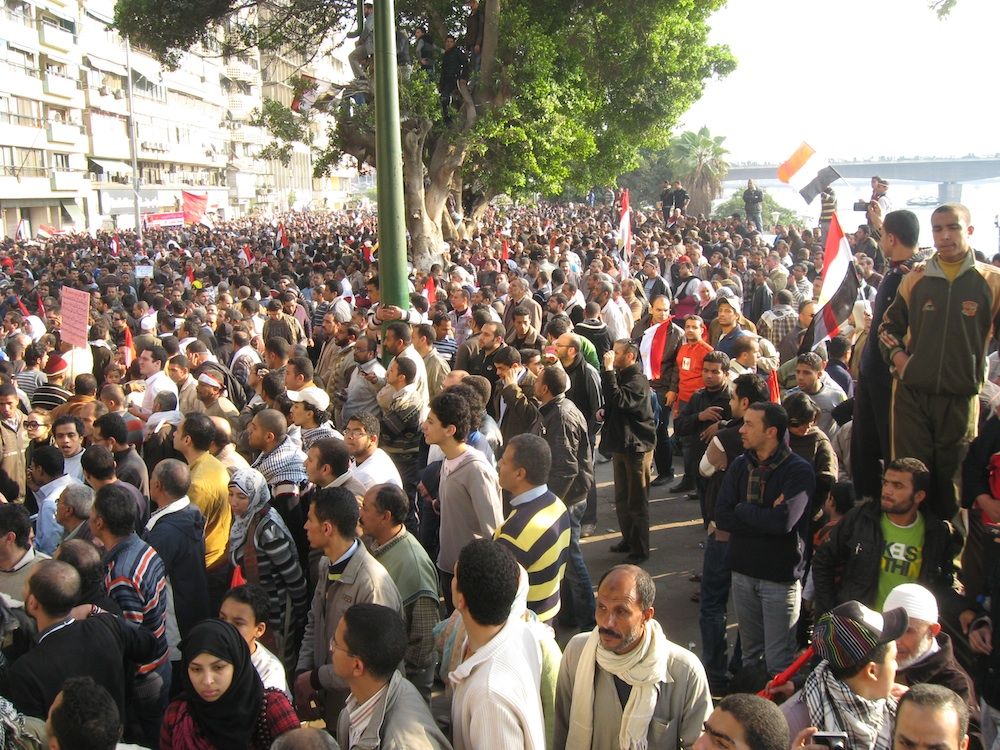In revolutions, barriers can fall hard and fast. In a packed Christian church in downtown Cairo this week near Tahrir Square, one barrier toppled to the sound of hymns and clapping hands: a youth leader of Egypt's outlawed Islamist Muslim Brotherhood, talking tolerance to a congregation of hundreds of warmly applauding Christians.
Islam Lotfi, a 33-year-old lawyer and Brotherhood activist, spoke at a memorial service Wednesday night at Kasr al-Dobara church, a Protestant congregation near the Cairo square, Tahrir, that was the center of Egypt's revolution. The service – noisy with prayers, hymns, taped video tributes to the young protesters, and wails from the pews - commemorated the Muslim and Christian young people killed in the uprising.
Egypt's Christians make up roughly 10 percent of the country's 80 million people. Fundamentalist Islamist violence and alleged government discrimination have chased hundreds of thousands of them into exile in recent decades. This year began with a New Year's Eve bombing that killed 24 Coptic Christians at a church service in the city of Alexandria
Lotfi, however, told the congregation of the protests in Tahrir Square, and how young Christians and Muslims stood guard for each other at the height of the violence.
When pro-government forces attacked, "Muslims stood to protect the Christians at prayer," Lotfi said, describing defense lines of young men, holding rocks, that formed at each faith's time of worship. "And then Christians stood to protect the Muslims."
"Muslim and Christian were all one hand,'' he said, evoking a commonly used phrase these days. In Tahrir Square, religious hatred ''was all a great illusion," the Muslim Brotherhood member said at the pulpit, before stained-glass windows bordered with long Egyptian flags.
Photos of young people, Muslim and Christian, killed by security forces or pro-government mobs during the 18-day revolution flashed by on overhead screens.
In the congregation, visiting Muslim families of the dead sat with mourning Christian families, the Muslim women with their heads veiled. Worshippers waved Egyptian flags – tiny flags on small skewers and giant flags on heavy staves, which men swept back and forth over the heads in the crowd.
"Before the revolution, like many Christians, I was planning to leave Egypt,'' Sally Tooma Moore, a 32-year-old doctor and Coptic Christian who'd been a leader of the protests, told the congregation. "Now I will stay."
Families filled the pews. Teenagers and men and women in their 20s and 30s mostly stood outside and followed the prayers and hymns on giant TV screens and chatting with their friends.
The service marked the dominant role of young people in Egypt's revolution, which came after a December revolution in Tunisia similarly led by that country's youth. People below the age of 30 make up more than 60 percent of the population of North Africa and the Middle East overall, and of Egypt as well. North Africa and the Middle East also have the highest regional rates of unemployment in the world, with youth unemployment running higher than 30 percent. Young people charge that the region's dictatorships have deprived them of a say in politics, of economic opportunity, and, until now, of hope.
No one has provided a count, but press reports make clear that young people made up the majority of the more than 300 people that rights groups and Egypt's government say were killed during the protests that swept President Hosni Mubarak from power Feb. 11. At the church service, ministers called to the altar the mothers and fathers of some of the slain. They described briefly how they died – Ahmed. PhD student. Shot five times, then crushed by a car, the minister said, as the photo of a smiling man with a narrow face flashed overhead.
Christians brought to the altar Ahmed's father, holding him up by the arms before he sagged into a chair up front. Ahmed's mother, her head covered in the trailing black veil of a conservative Muslim woman, stood by him. She worked to hold a smile on her face because, she said afterward, this was a celebration of the short lives of her son and his friends.
"The blood of your children is not in vain," a minister of the church cried. "Thank you, thank you. Young people, thank you, thank you."
Lotfi , the Brotherhood member, is a leader of the youth wing of the outlawed Islamist movement. The youth movement within the Brotherhood has sought since roughly 2005 to encourage the aging mainstream Brotherhood leadership to speak of issues of immediate concern to Egypt's majority, to embrace the Internet, and perhaps to split from potentially violent fundamentalists whom the young people say remains inside Egypt's Brotherhood.
Despite the euphoria following the revolution, fissures remain between fundamentalist and moderate Muslims, and between Muslims and Christians. In a move that is proving divisive, the military council that now rules Egypt appointed a Muslim Brotherhood member as one of the few partisan figures to a committee charged with rewriting the constitution. The appointment sparked charges in the press that the military junta is seeking to use religious rivalry to split Egypt's opposition.
Lotfi, round, composed and looking older than his years, basked in the warmth of this week's service. He had spoken before to Christian audiences, but never to the kind of reception he received in Tahrir Square, and Kasr-al-Dobara, he said afterward.
"It's amazing,'' he said, and spoke of one of the first, turbulent days of the uprising, when the Muslim and Christian protesters defended themselves against mass charges by mobs. "Everything changed after the 28th of January."
